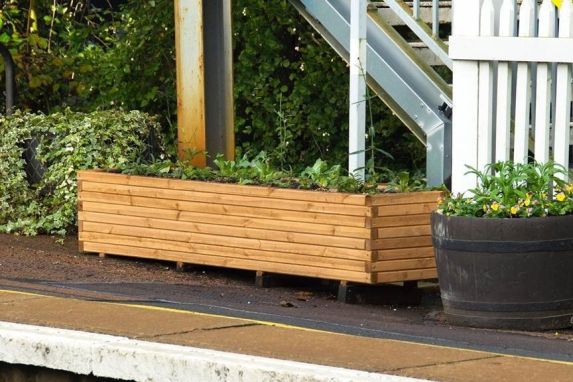Published on: Tuesday, 17 November 2020
Last updated: Tuesday, 17 November 2020
A partnership between local volunteers, the Wherry Lines Community Rail Partnership and Greater Anglia will see a rail station platform filled with rare flowers.
Two large planters have been installed on the platforms at Brundall Gardens, Norfolk, thanks to funding from the Wherry Lines Community Rail Partnership.
They will be planted and cared for by volunteers who have ‘adopted’ the station as part of Greater Anglia’s Station Adoption initiative which sees people across the network get involved with their local stations to come up with ideas and projects that benefit their communities.
An endangered cornflower - Centaurea Cyanus – which is also an important food source for bees, butterflies and other pollinating insects – will be included in the display.
Gillian Lincoln, one of the station adopters said, "Our ethos here at Brundall Gardens is to grow as many of our plants as possible ourselves from seed, with the emphasis on sustainable planting.
"The cornflower that we are planting has suffered greatly in the wild due to over-use of pesticides and the effects of intensive farming but now it will have a safe haven here on the station platform and will help to support our local populations of bees, butterflies and other pollinators.
"The planters will also provide colour and scent to delight people as they wait for trains. In these difficult times our vision is to create a calming environment to appeal to both station users and our local community.
"We are trying to be as nature friendly as possible by making our own compost, harvesting seeds and growing our own more drought tolerant varieties."
Greater Anglia’s Customer and Community Engagement Manager, Alan Neville, said, "We are very grateful to the Wherry Lines Community Rail Partnership for funding these planters and to the Station Adoption team at Brundall Gardens for their dedication to bringing attractive floral displays to the station that will benefit local wildlife.
"This project will further help to provide a warm welcome to everyone who uses the station and a create a real source of pride for the community."
Across Greater Anglia’s network many other station adopters are also making their rail stations more wildlife friendly – with the railway increasingly being recognised by ecologists as a ‘green corridor’ which provides a sanctuary for many different kinds of flora and fauna.
Many have planted gardens which provide habitats for local wildlife as well as making the stations more welcoming. In total over 5700 square metres of gardens are tended to – the equivalent of 29 tennis courts.
Last year, Greater Anglia reduced its total carbon emissions by 11% overall, preventing 13,570 equivalent tonnes of carbon dioxide, a greenhouse gas that contributes to global climate change, being released into the atmosphere.



